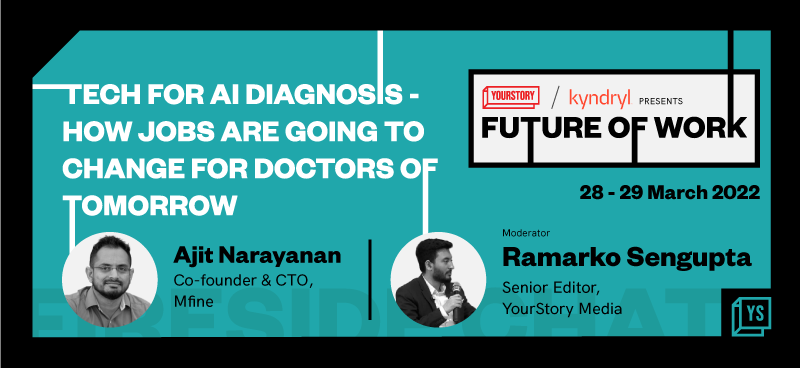Artificial Intelligence (AI) is helping reimagine healthcare globally. By 2030, the global AI medical care sector is predicted to be worth $194.4 billion. But how will AI define the role of a doctor in the future?
Ajit Narayanan, Co-founder and CTO of one of India’s leading AI-based consumer healthcare platforms, mFine, addressed this at YourStory’s Future of Work 2022 summit. He assured that despite the boom in technology, doctors would continue to hold the centre stage in healthcare.
“Doctors are the central figures. The technologies that we build for this sector are not replacing them, but are assisting them to provide better health services to a larger population more efficiently,” he said.

Incorporating technology into healthcare
Ajit, who worked with the likes of Myntra and SAP Labs India, shifted his attention to health tech when he saw the potential of AI and how it could create a larger impact among the masses.
“We recognised that the country’s healthcare was in need of large scale intervention from technology. Even the best hospitals in the country had only minimal usage of technology, making health services inefficient. This was our calling that we needed to do something in the healthcare sector,” said Ajit.
He felt that the absence of an adequate number of doctors in the country even before the pandemic was a premonition that their roles needed a technological upgrade.
“Rural patients often don’t have access to enough doctors in their vicinity for their varied health issues. But during covid, the gap between patients and doctors was observed even in urban areas. Unless it was absolutely necessary, people started avoiding hospitals to get treatment for their health problems as they feared contacting Covid-19. A solution to all this is making each doctor a ‘superdoctor’ by enabling them with AI. This way they can cater to more patients than what they usually do and overcome geographical barriers,” he said.
Ajit observed that almost 90 percent of the time during a doctor’s visit is spent in assessing the symptoms and medical history of the patient which can get redundant and carries the potential of human error during diagnosis.
“So we thought, what if this entire investigative process is put into a machine that would record all the medical history, symptoms and provide the analysed information to the doctor, that too repeatedly for multiple patients and without any errors? Therefore, AI can only go hand-in-hand with the doctors, assist them and not replace them, no matter how advanced it gets,” he said.
Increased awareness due to COVID
Ajit says that the pandemic made people more aware of the importance of technology in healthcare.
“During the pandemic, consumer know-how and interest in healthcare increased dramatically. The providers of healthcare recognised the impact of technology in the sector. Gone are the days when we had to explain the importance of tele-medicine to the doctors,” Ajit said.
Challenges ahead
Ajit felt that the mistrust towards technology in healthcare comes from technology being directly introduced to the consumers without human intervention.
“We, in mFine, do not directly expose the technology to the customers. When the user onboards himself on mFine, they can find an AI-based investigative process about their ailment. This is a process that the machine has learnt to do from the doctor and is doing it on behalf of the doctor,” he said.
Another major challenge is the belief that all ailments, big or small, require a visit to the doctor.
“Based on our data, less than 10 percent of our ailments require a physical visit to the doctor for them to make a diagnosis. Only over time do people start realising that there is no need to visit the doctor for everything. With technology, people can stay at home, get simple medical examinations done through their phone and get the proper diagnosis and solutions” said Ajit.
He added, “Usually, many companies take a standard model created for a different demographic and try to use it for Indian conditions. One size doesn’t fit all and so that model fails to work. So it is important for companies that develop such solid AI to focus on data acquisition and creation process to ensure the accuracy and effectiveness of these solutions.”

Edited by Ramarko Sengupta
